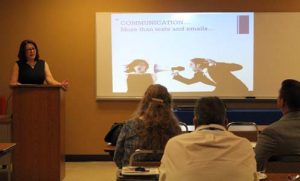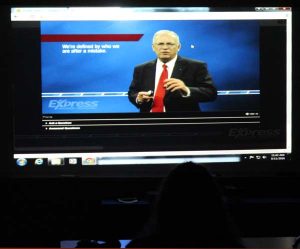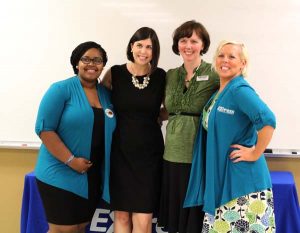Learning about Leadership and Community at an Express Pros Webinar
Written by Tony Mussari, Sr.
Edited by Kitch Loftus-Mussari
Copyright 2016
The Face of America Project
Mussari-Loftus Associates, LTD
A leader takes people where they want to go. A great leader takes people where they don’t necessarily want to go, but ought to be. —Rosalynn Carter
Destination: Dickson City
On a beautiful August morning, our Face of America journey took us to the McCann School of Business in Dickson City, PA. We went there to participate in a webinar featuring Jack Smalley, the director of HR Learning and Development for Express Employment Professionals.
Smalley, the director of HR Learning and Development for Express Employment Professionals.
The event was organized by Amy Clegg and her staff at the Express Pros office in Scranton.
When we arrived, Brittany Pagnotti, Rameika Jones and Nikki Schake were attending to all the little details that would make the event a success.
In our opinion, the venue was perfect. The atmosphere was welcoming. The food was delicious, and the sense of community was genuine.
At the appointed hour, Evan Miller, the Campus Director of the McCann School of Business, welcomed everyone with these gracious words; “We are happy you are here.”
A Very Special Moment
It has always been our pleasure to celebrate the accomplishments of Amy Clegg and her  team, but this time she turned the tables on us with an announcement that took us by surprise.
team, but this time she turned the tables on us with an announcement that took us by surprise.
By nature, Amy is a giving person. She likes to help others get ahead. On this special occasion, she introduced Alexis Shotwell to the audience. Alexis is a student at the McCann School of Business. She wants to specialize in early childhood education.
When Alexis came to the front of the room, Amy told the audience that Alexis would receive the first annual Dr. Tony and Mrs. Kitch Mussari Leadership Scholarship. The moment belonged to Alexis. The surprise belonged to Kitch and me. No words can accurately describe the expression of delight on Alexis’s face, and the feeling of gratitude in our hearts for this honor.
Priceless Thoughts from Patricia L. Camayd
Being a good listener is central to employee engagement, retention and productivity.
Patricia L. Camayd is the Business Manager for Oliver Price & Rhodes Attorneys at Law. When she was a child she overcame shyness, and she became a good listener. Today she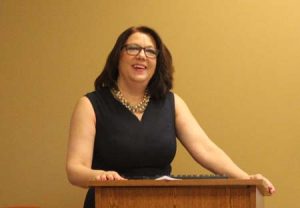 fully appreciates the importance of being a good listener. It is central to employee engagement, retention and productivity.
fully appreciates the importance of being a good listener. It is central to employee engagement, retention and productivity.
What is not said is often more important that what is said.
At the same time, she understands the importance of effective communications with employees. It is more than texts or e-mails. Effective communications is deeply rooted in the art of listening which requires these important elements: the elimination of distractions; the ability to read between the lines; eye contact; the ability to ask the right questions; showing respect; avoiding commentary or interjection; and matching the employee with the proper training and educational programs.
It is important to recognize and express gratitude to employees.
To move forward with employee engagement and aligned goals, it is important to think win win. Celebrate your joint and continued success. Say thank you as many ways as you can imagine is always a good idea.
Employees cherish personal letters that recognize their accomplishments.
These are a few of the things Patricia does to build effective employee relationships.
Establish mentorship programs.
Hold regular individual meetings for professional development.
Establish recognition programs, wellness programs, health and relaxation techniques.
Conduct team building exercises.
Encourage employees to write attributes about others which contribute to the organization to be read publically.
She ended her presentation with an excerpt from the poem Desiderata:
With all its sham drudgery and broken dreams, it is still a beautiful world. Be careful. Strive to be happy. Max Ehrmann
Jack Smalley’s Sage Advice
We are defined by who we are after we make a mistake.
Jack Smalley is the Director of HR Learning and Development for Express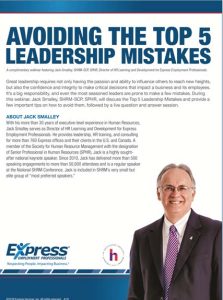 Employment Professionals. For more than a generation Jack has been doing all he can to improve the workplace environment. He is best described by this observation from Brian Tracy:
Employment Professionals. For more than a generation Jack has been doing all he can to improve the workplace environment. He is best described by this observation from Brian Tracy:
Become the kind of leader that people would follow voluntarily; even if you had no title or position.
On this day, Jack addressed The Top 5 Leadership Mistakes.
Mistake 1
Do not assume that your best employees do not need recognition. According to Jack, your best employees need and deserve recognition. Employees and supervisors should be given credit where credit is due.
Mistake 2
Don’t accept mediocre performance from C employees. Lowering the bar for the C employees who make up about 50% of the workforce will not move the organization forward. Overloading the A performers who make up 20% of the workforce is not the answer. There is no such thing as a good employee with a bad attitude.
Mistake 3
Dictator Decision Makers will not improve the work environment.
Referencing a famous quote by Sir Francis Bacon, Knowledge is power, Jack made the case for embracing people who think differently. He believes that great leaders know the value of maverick thinkers. Great leaders enable people to be different.
Mistake 4
Great leaders know how to communicate effectively.
Employees need to know what is going on. An employee deserves honesty. When it comes to leadership, everything is on the table.
The messenger is as important as the message especially when the message is bad news.
The top communication mistake is not telling the truth.
Mistake 5
The failure to mentor employees is a critical mistake.
In a compelling way, Jack used his own experience to demonstrate the importance of mentoring. His grandfather advised him to find something in life you enjoy. His father was his best friend. As a fire chief, he lived by these words: Don’t ask people to do things you are not willing to do yourself.
When Jack was 12 years old, he admired the quarterback of the high school football team. Every Saturday, he would meet with Sammy Dugger who mentored Jack. This was a priceless experience. It enabled Jack to become a successful football player in his own right, and it documented virtually all of the characteristics of successful mentoring.
Relationships matter. There is not a leader on earth who can succeed without employees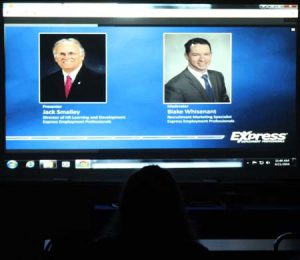 sharing information. You must surround yourself with good people, and you must be credible. Avoid anonymity. At all cost, take a personal interest in people.
sharing information. You must surround yourself with good people, and you must be credible. Avoid anonymity. At all cost, take a personal interest in people.
Jack’s greatest mentor is his wife. She taught him the greatest lesson. Live family first.
When Jack mentioned David Cottrell’s book I thought about a famous quote from Monday Morning Leadership. It is a perfect description of Jack Smalley’s leadership philosophy:
Leadership can’t be claimed like luggage at the airport. Leadership can’t be inherited, even though you may inherit a leadership position. And leadership can’t be given as a gift – even if you’ve been blessed with an abundance of leadership skills to share with someone else. Leadership must be earned by mastering a defined set of skills and by working with others to achieve common goals. David Cottrell
The Express Employment Professionals Webinar event was an excellent example of what Jean Vainer wrote about community:
One of the marvelous things about community is that it enables us to welcome and help people in a way we couldn’t as individuals. When we pool our strength and share the work and responsibility, we can welcome many people, even those in deep distress, and perhaps help them find self-confidence and inner healing.
On this special day we experienced America at its very best, and for this wonderful learning experience we want to thank:
Nikki Schake:
Brittany Pagnotti;
Rameika Jones;
Evan Miller;
Patricia L. Camayd:
Jack Smalley.
You are the Face of America on its best day, and we are in your debt.
Please provide feedback to:
tony.mussari@gmail,com
